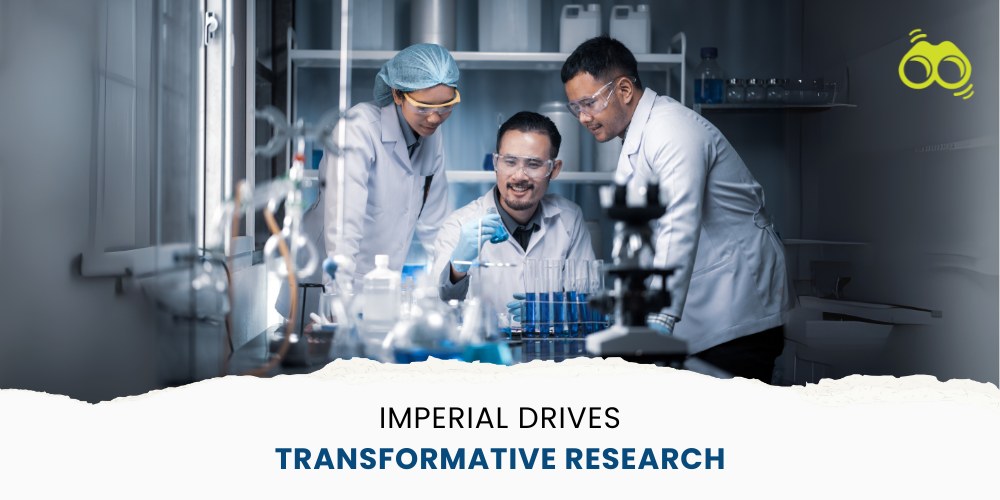Government Supports Innovation with £80M Funding: Imperial Among Beneficiaries
Imperial's Research Projects to Benefit from Substantial Government Investment
The Imperial College London Researchers and 38 other institutions will receive a share of £80m in funding from UKRI’s Engineering and Physical Sciences Research Council (EPSRC) to support 100 ambitious projects in healthcare, clean energy, AI, and quantum computing. Science Minister Lord Vallance emphasised the importance of curiosity-driven research, describing it as a key driver of breakthroughs, such as fast-track vaccines and lithium-ion batteries, which improve lives and boost the economy. He stated that the projects receiving this funding could lead to innovations such as more comfortable and effective prosthetic limbs and earlier detection and prevention of blood clots.
At Imperial College London, funded projects cover diverse fields, including the impact of hip muscles on knee pain and AI-driven design for high-performance vehicle parts. Professor Mary Ryan, Vice-Provost (Research and Enterprise), highlighted that Imperial’s research is driven by curiosity, innovation, and a commitment to addressing global challenges. She emphasised that discovery-driven research is essential for achieving excellence and impactful societal breakthroughs.
At Imperial College London, funded projects range from studying hip muscles' effect on knee pain to using AI-driven design for high-performance vehicle parts. Professor Mary Ryan emphasised that Imperial’s research, driven by curiosity and innovation, aims to address global challenges and deliver transformative breakthroughs. She also highlighted how these projects align with the university’s "Science for Humanity" strategy, showcasing innovations like orthopaedic implants, drug delivery systems, and solar-powered green hydrogen technology.
Professor Charlotte Deane, Executive Chair of EPSRC, highlighted that discovery science is vital for driving innovation and ensuring progress in prosperity, sustainability, security, and quality of life. She noted that the UK has long excelled in this field, with EPSRC leading efforts to expand expertise nationwide. The new EPSRC-backed projects aim to create groundbreaking knowledge with a global impact.
The projects at Imperial cover a wide range of innovative research areas. Dr. Richard van Arkel is working on orthopaedic implants that control healing, while Professor Mark Crimmin focuses on carbon-carbon bond activation using main group metals. Professor James Durrant is developing organic photocatalysts for solar-driven green hydrogen synthesis. Dr. Julie Euvrard is exploring the Hall effect in organic semiconductors to improve charge transport efficiency. Professor Jonathan Jeffers is studying the impact of hip muscles on knee pain. Professor Eric Kerrigan has two projects on large-scale phenomena control and coalitional control for buildings. Professor Jeroen Lamb is researching predictive models for complex dynamical networks, and Dr. Nan Li is working on AI-driven design for high-performance vehicle parts.
Dr. Reshma Rao is designing electrocatalysts for green hydrogen production, while Dr. Adam Jan Sadowski is creating digital twins for offshore wind structures. Professor Edward Tate is focused on discovering next-generation antibody-drug conjugates, and Dr. Eleanor Tubman is investigating self-generated magnetic fields in hohlraums. The £80 million funding from UKRI’s EPSRC will drive transformative breakthroughs by addressing global challenges and contributing to sustainability, security, and economic growth.
Editor's Note:
In a major boost to innovation, a substantial new funding initiative will support a range of pioneering projects across critical fields such as healthcare, clean energy, and artificial intelligence. These initiatives are designed to drive transformative breakthroughs with the potential for profound global impact. At the heart of this initiative is curiosity-driven research, which will tackle some of society's most pressing challenges while contributing to a more sustainable and prosperous future. The funding highlights the UK's commitment to advancing cutting-edge science and technology, and fostering innovation that can address critical global issues like climate change, public health, and technological advancement.
Skoobuzz is optimistic that this project will open new pathways to a sustainable future, providing solutions that can help combat the world's most urgent challenges.














0 Comments (Please Login To Continue)